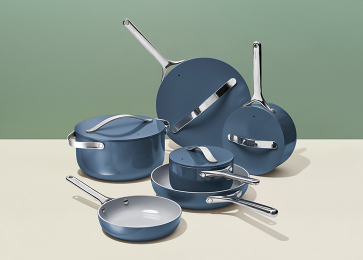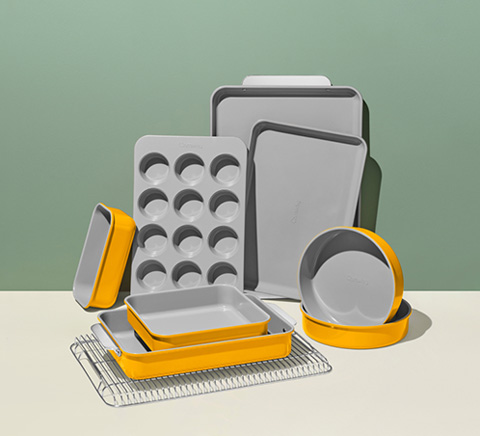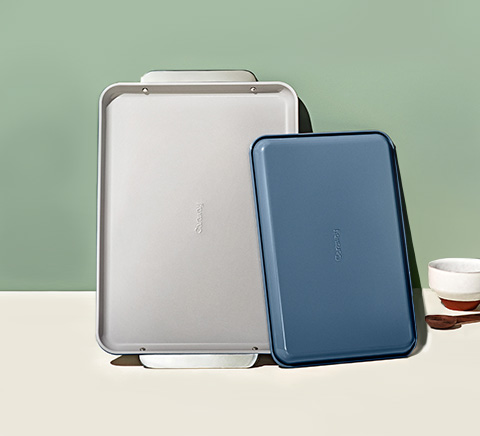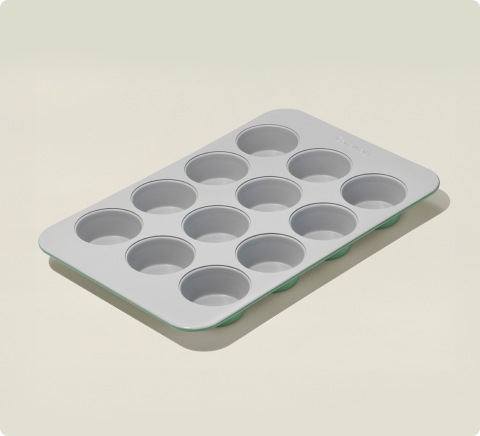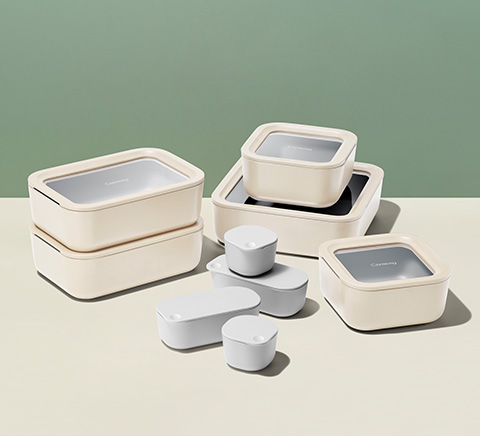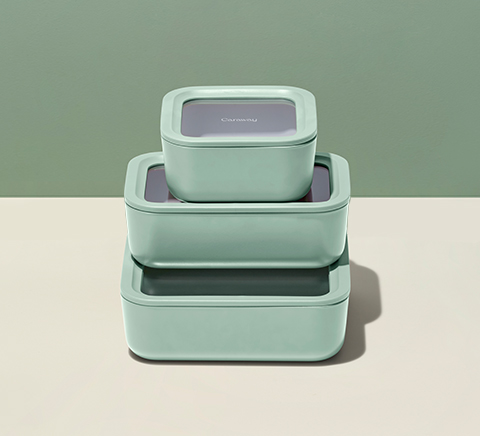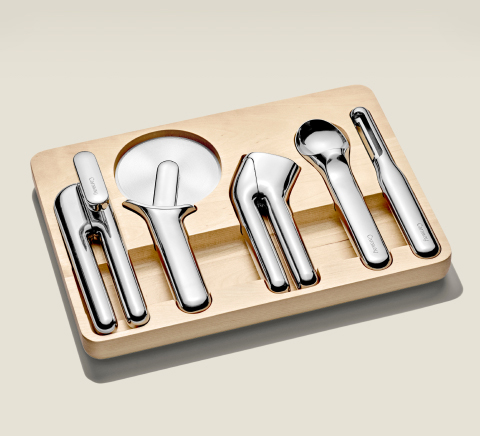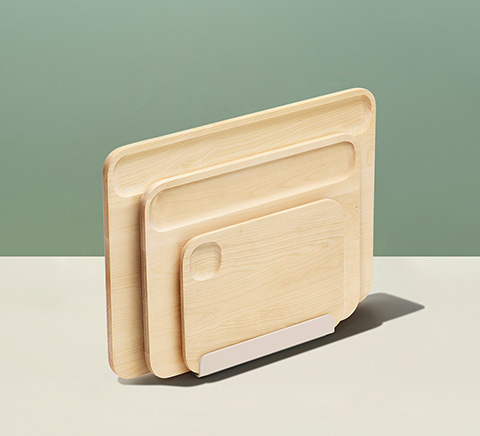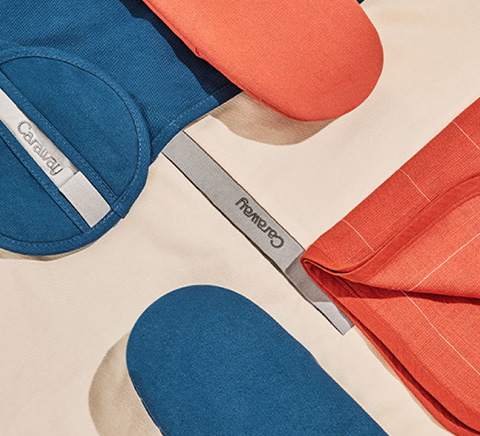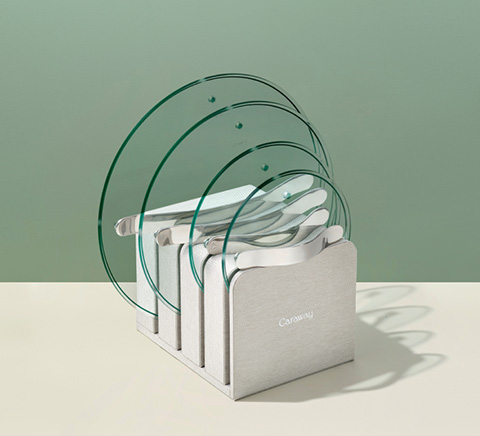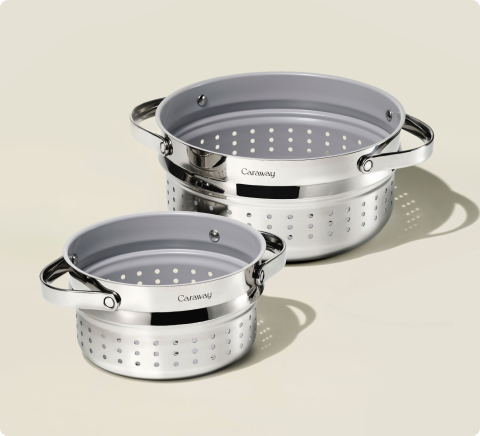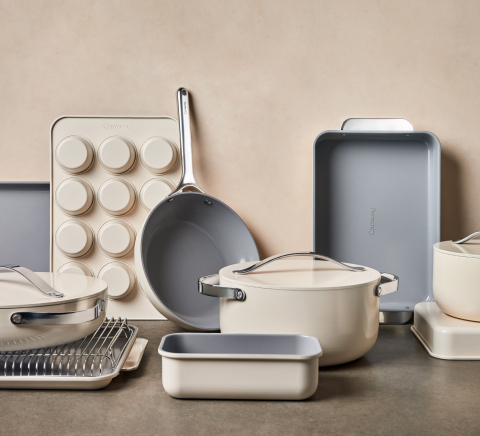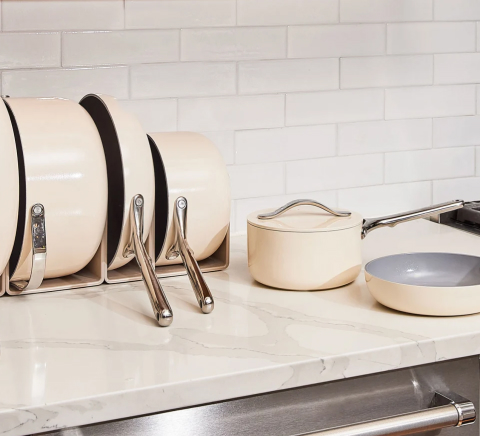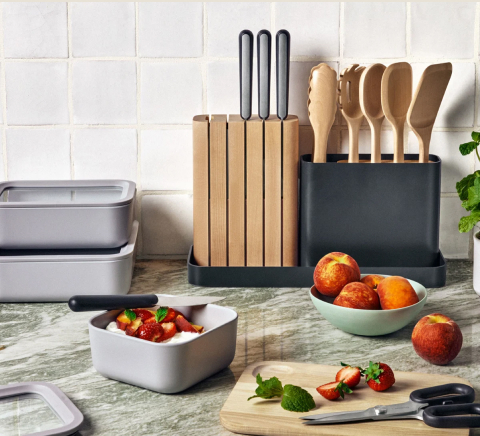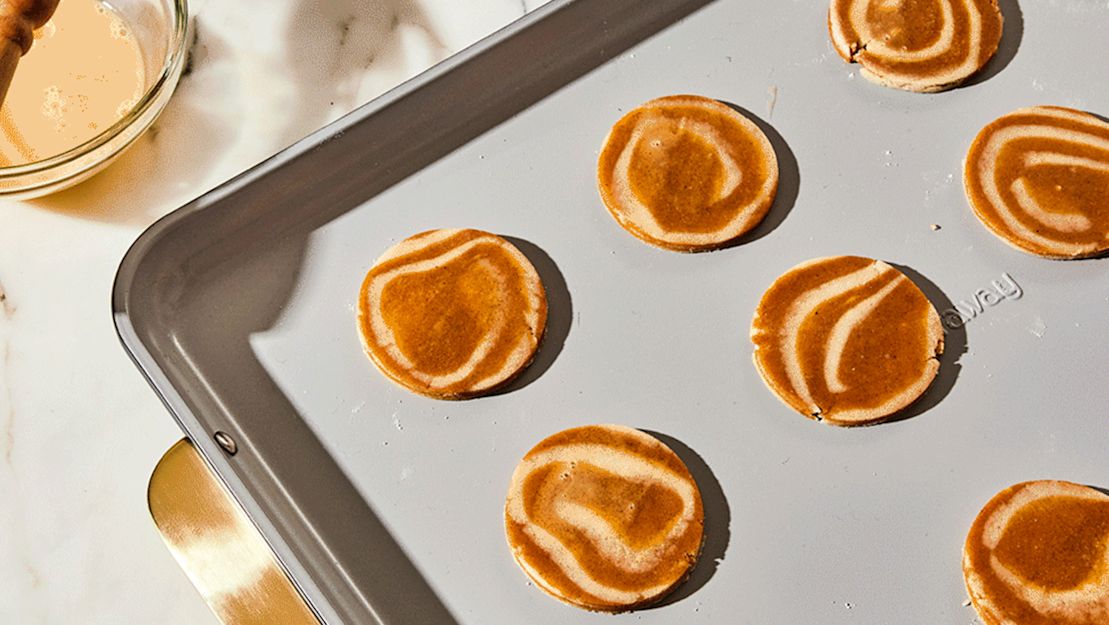Ever wondered how much the material of your cookware impacts your health and the environment? At Caraway, we understand that the safety of what you cook with is as critical as the ingredients you cook. That's why we are committed to crafting some of the safest, most sustainable cookware available online.
In this article, we'll dive deep into what makes Caraway the go-to choice for health-conscious cooks and those dedicated to a sustainable lifestyle. So, if you're ready to make informed choices about the tools you use in your kitchen, let's get started.
What Makes Caraway Cookware So Safe?
Caraway is dedicated to redefining the safety standards of cookware without compromising on performance. Here's how we ensure each product serves your health and environmental well-being:
Superior, Safe Materials
Our commitment to your safety starts with selecting the right materials. Caraway cookware sets feature a ceramic coating that is free from PFOA, PTFE, and other harmful chemicals commonly found in traditional cookware.
This means you can cook at higher temperatures without worrying about toxic fumes or leaching chemicals. Ceramic is known for its natural non-stick properties, reducing your need for excessive oil and making clean-up a breeze.
Rigorous Standards for Peace of Mind
We don't just rely on our high-quality materials; every Caraway product undergoes stringent testing to ensure it meets global safety standards. Our cookware is tested to outperform and outlast conventional cookware, providing reliability in every meal you prepare.
Designed for Everyday Use
Safety in design extends to ease of use. Caraway cookware is crafted to provide excellent heat distribution, which ensures your food cooks evenly without hot spots. This careful attention to design helps prevent burning or undercooking, making your kitchen experiences safer and more enjoyable.
Eco-Friendly from Start to Finish
Caraway's approach to safety includes protecting the environment. We utilize eco-friendly manufacturing processes that reduce carbon emissions, and our cookware is shipped in recycled packaging to minimize waste. By choosing Caraway, you are investing in a product that cares for the planet as much as it does for your health.

The Benefits of Caraway's Material Choices
Choosing the right materials for cookware doesn't just affect cooking performance. It significantly impacts health and environmental sustainability. Caraway's meticulous selection of materials for both our ceramic and stainless steel lines showcases our commitment to these ideals.
Here's a closer look at the benefits these materials offer, ensuring our cookware is safe, effective, and eco-friendly.
Advantages of Ceramic Cookware
-
Health and Safety: Our ceramic cookware is coated with a premium, non-toxic surface free from harmful chemicals such as PFOA and PTFE, which are common in traditional non-stick pans. This ensures no toxic substances are released into the air or your food during cooking, even when subjected to high temperatures.
-
Efficiency in Cooking: Caraway's ceramic cookware boasts exceptional heat distribution. This even heating ensures foods cook more uniformly, reducing the likelihood of overcooked or undercooked spots. The excellent thermal properties of ceramic make it ideal for a variety of cooking techniques, from simmering to searing.
-
Ease of Maintenance: Our ceramic-coated cookware's smooth, naturally non-stick surface allows for easier cleaning. Foods release effortlessly, minimizing the need for scrubbing and reducing the amount of water and detergent needed for cleaning. Moreover, the durability of the ceramic coating ensures it remains effective over time without the chipping or peeling associated with other non-stick coatings.
Benefits of Stainless Steel Cookware
-
Durability and Longevity: Stainless steel is renowned for its strength and resistance to rust and corrosion. Caraway's stainless steel cookware is built to last, maintaining its integrity and appearance through years of regular use. This durability means fewer replacements and less waste, aligning with our sustainability goals.
-
Superior Heat Conductivity: Stainless steel is an excellent conductor of heat, and our multi-ply stainless steel cookware maximizes this property. The layers of steel and aluminum are engineered for optimal heat retention and distribution, which enhances the cooking performance and saves energy.
-
Versatility: Stainless steel is incredibly versatile and can handle everything from high-heat searing to gentle simmering. Its non-reactive nature means it does not impart unwanted flavors into foods, even when cooking acidic ingredients like tomatoes or vinegar-based sauces.
-
Environmental Impact: Stainless steel is not only durable but also 100% recyclable. The longevity of our stainless steel cookware reduces the need for frequent replacements, thereby contributing to less consumer waste.
By integrating these materials into our product lines, Caraway upholds our commitment to safety and health and champions environmental sustainability and superior culinary performance. Whether you opt for our ceramic or stainless steel options, you can trust you're using some of the best cookware materials available, designed with the present and future in mind.
![]()
Essential Tips for Safe and Efficient Cooking
Safe and efficient cooking goes beyond just choosing the right cookware. It involves adopting practices that enhance your culinary experience while ensuring food safety and maximizing the longevity of your cookware.
Here are 10 tips to help you cook safely and effectively:
1. Preheat Properly on Induction Cooktops
Gradually preheat your frying pans on induction cooktops to avoid thermal shock. This is especially important for nonstick cookware to ensure even cooking without damaging the non-stick surface.
2. Choose the Right Utensils
Protect the surface of your nonstick pans by using wooden or silicone utensils instead of metal. Our 14-piece knife & utensil set is designed to be gentle on all cookware surfaces, preventing scratches and preserving the nonstick properties.
3. Moderate the Heat for Searing Steaks
When searing steaks, use a medium-high setting on stainless steel pans to achieve perfect caramelization without overheating, which can degrade nonstick coatings if used improperly.
4. Optimize Oil Usage
With Caraway's ceramic cookware, you can cook using less oil due to its excellent non-stick properties, which supports a healthier cooking method and makes clean-up easier.
5. Maintain Your Cookware Regularly
Hand wash your pots and pans to maintain their condition. This is imperative for cookware materials like enameled cast iron and stainless steel, ensuring they have a long lifespan.
6. Smart Storage Solutions
Store your cookware properly by using soft cloths or cookware protectors between items to prevent scratches---especially important for materials like copper pans and aluminum cookware, which are prone to nicks.
7. Utilize Each Pan Accordingly
Use the right type of cookware for different cooking methods; stainless steel cookware is ideal for higher-heat methods like stir-frying and braising, while ceramic cookware is perfect for slow cooking and simmering soups.
8. Avoid Thermal Shock
Allow pans to cool before washing to prevent warping, which is particularly crucial for cast iron cookware, which can crack with sudden temperature changes.
9. Stir Regularly to Prevent Hot Spots
Ensure even cooking by stirring food regularly, particularly when using cookware like stir-fry and sauté pans, which concentrate heat in specific areas.
10. Verify Oven Safety
Always check if your cookware is oven-safe before starting a recipe, especially when using Dutch ovens or griddles, which are often transitioned from stovetop to oven.

Frequently Asked Questions About Caraway Cookware
As you consider adding Caraway cookware to your kitchen essentials, you may have some questions about its features and benefits. Here are some of the most frequently asked questions to help you understand why Caraway stands out as the best cookware material for safety, performance, and sustainability.
Can Caraway cookware be used on high heat?
Yes, Caraway cookware is designed to withstand high temperatures. Our stainless steel options are perfect for high-heat techniques like searing and stir-frying, while our ceramic cookware excels in even heat distribution for all cooking methods.
How should I clean my Caraway cookware to ensure it lasts?
Hand washing with mild detergent is recommended to maintain the longevity and appearance of your cookware. Avoid using abrasive scrubbers or harsh chemicals, which can damage the non-stick surface. For our stainless steel cookware, using a softer sponge and gentle detergents will keep it looking new.
Are Caraway for our stainless steel cookware utensils safe to use with non-stick cookware?
Absolutely! Our Prep Set is crafted to be compatible with non-stick surfaces, preventing scratches and damage. These utensils are made from FSC-certified birch wood, which is gentle yet durable for everyday cooking.
Can I recycle Caraway cookware if I decide to upgrade my kitchen tools?
Yes, sustainability is a core part of our mission. Stainless steel is 100% recyclable, and we encourage recycling old cookware responsibly as part of our commitment to environmental stewardship.
Conclusion
At Caraway, we take pride in offering cookware that combines safety, performance, and environmental responsibility, designed specifically with both home cooks and professional chefs in mind.
Our dedication to creating the safest, most sustainable cookware on the market means you can trust every meal to be delicious and prepared with care for your health and the planet. With Caraway, you're not just cooking but making a conscious choice for a better world.
Ready to elevate your culinary experience? Explore our range today and see why Caraway is the go-to choice for discerning cooks everywhere. Cook better, live healthier, and support sustainability with every dish you create. Shop now and join the Caraway family!
Sources:
Undisclosed PFAS coatings common on cookware, research shows | Ecology Center
Cooking food | Institute of Food Science and Technology
Sources of Greenhouse Gas Emissions | US EPA
You Can't Always Trust Claims on 'Non-Toxic' Cookware | Consumer Reports
